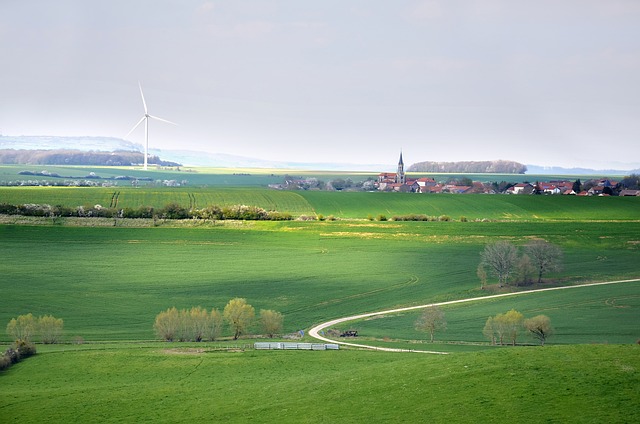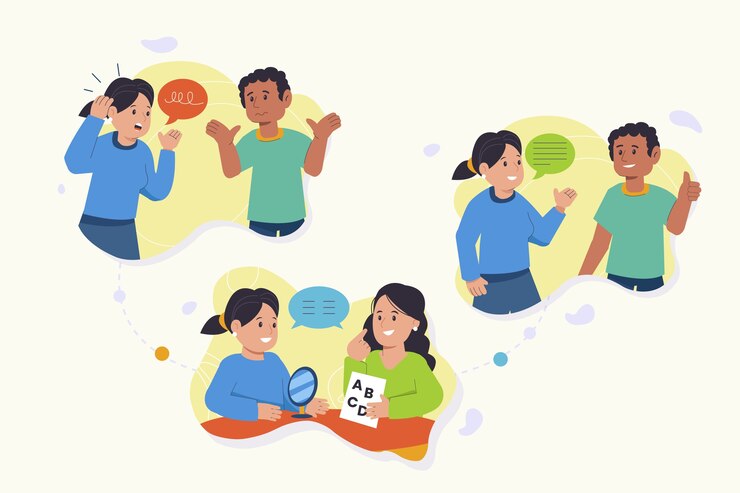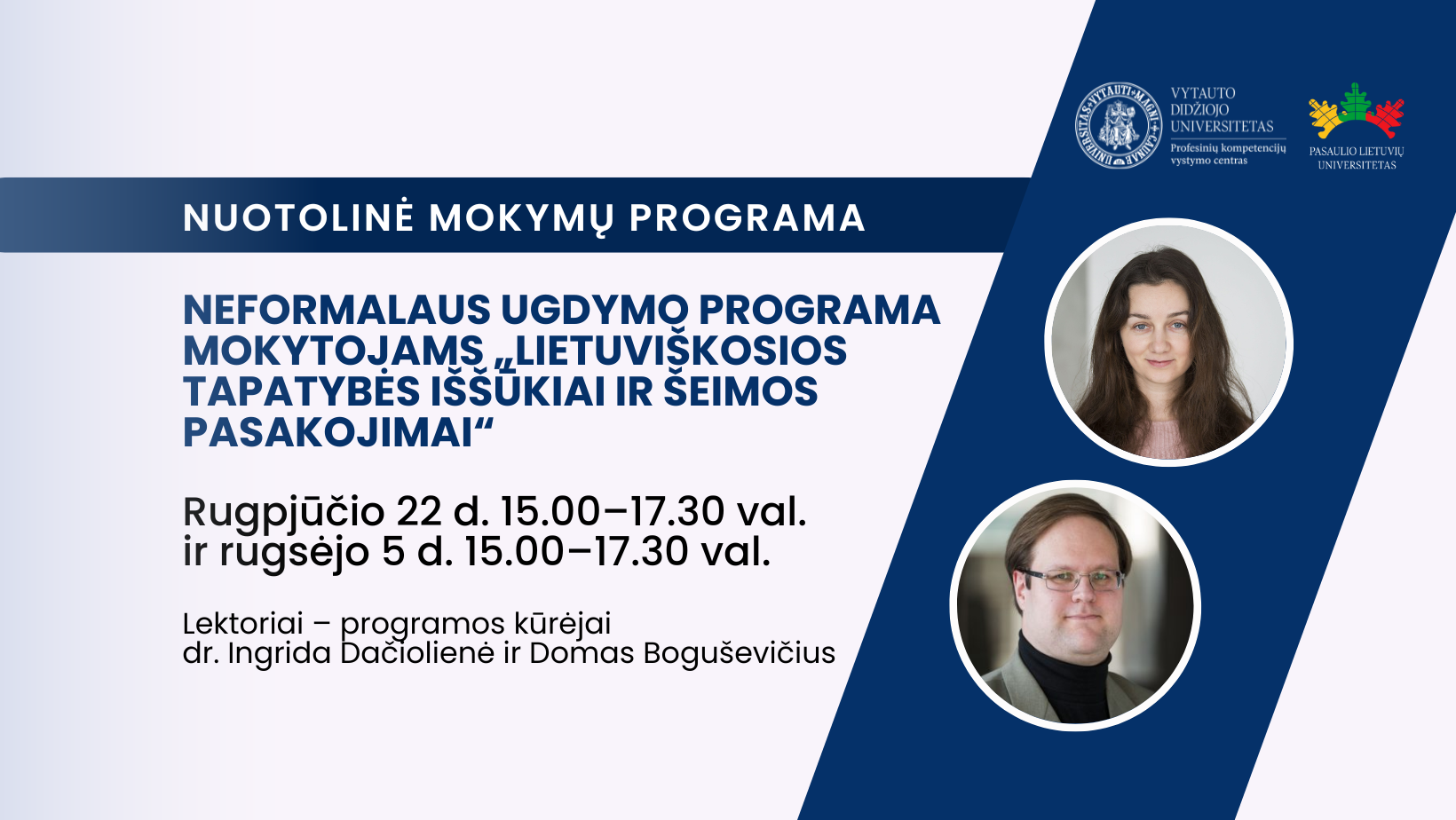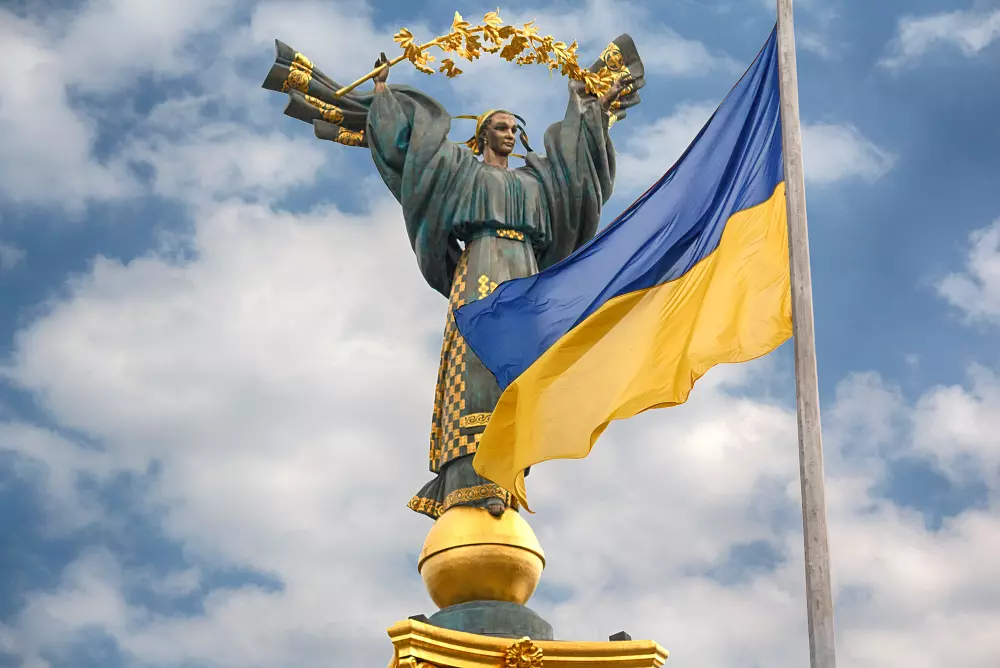-
Indrė Žakevičienė
Airina Volungevičienė
Vijolė Višomirskytė
Triin Vana
Gintarė Vaitonytė
Jurgita Vaičenonienė
Tadas Vadvilavičius
Daiva Urmonienė
Vidmantas Tūtlys
Elena Trepulė
Margarita Teresevičienė
Available courses

The aim of the course is to deepen and expand the highly specialized knowledge of students in the field of sustainable use of natural resources and to develop the competencies of students needed to solve complex problems of natural resource management to achieve the goals of sustainable development.
Created on: 2023 03 16
- Teacher: Vilma Atkočiūnienė
- Teacher: Anželika Dautartė
- Teacher: Elvyra Jarienė
- Teacher: Monika Medikienė
- Teacher: Otilija Miseckaite
- Teacher: Živilė TARASEVIČIENĖ

Having completed this course you will:
- Be able to identify the most important concepts of dialogue in 20th century philosophy.
- Compare and evaluate different philosophical functions of dialogue.
- Independently articulate the premises of a given concept of dialogue.
- Discuss the relevance and importance of the philosophical problem in contemporary world.
Topics:
- Features and main issues of 20th century philosophical concepts of dialogue.
- Overview of 20th century authors of the philosophy of dialogue.
Scope:
15 academic hours of consultations
100 academic hours of individual work
Beginning:
(Dates may vary depending on the academic calendar)
- Teacher: Viktoras Bachmetjevas

Having completed this course you will:
- Be familiar with key ethical questions in Greek philosophy and their historical and cultural context.
- Evaluate the practical nature of Greek philosophy as a way of life.
- Recognize the uniqueness of the sources of Greek practical philosophy and the importance of interpreting them appropriately.
- Consider the distinctiveness of cultural contexts in ethical philosophy across different historical periods.
- Identify the questions and transformations of practical philosophy from Antiquity in contemporary philosophical culture.
- Apply knowledge of ancient practical philosophy in discussing current issues in practical philosophy.
Topics:
- The field of “philosophy” in the intellectual landscape of 5th century BCE Greece.
- The "parts" of ancient philosophy.
- The historical trial of Socrates and the theme of Socratic apology in Plato’s dialogues.
- Theories on the origin of ethical and political norms. Physics and ethics.
- Plato’s Academy (the institutionalization of philosophy).
- Aristotle’s ethics, with a focus on key themes in the Nicomachean Ethics.
- Hellenistic philosophical schools: Epicurus’ Garden; the Stoics, including Marcus Aurelius.
- Plato’s Academy and the traditions of Platonism.
- Plotinus, Porphyry’s Life of Plotinus, and the Enneads.
Scope:
15 academic hours of consultations
100 academic hours of individual work
Beginning:
(Dates may differ depending on the academic calendar)

Having completed this course you will:
- Be able to connect the main concepts of ethics with their underlying theories and authors.
- Know and interpret the development of philosophical ethics.
- Understand the differences among trends and methods in contemporary philosophical ethics.
- Be able to raise ethical questions and relate them to relevant theories and dilemmas.
- Recognise ethical problems by analysing phenomena of contemporary culture and society.
Topics:
- Trends and problems in contemporary continental ethics.
- Discussion of authors in contemporary ethics.
- Analysis of development of contemporary ethics.
Scope:
15 academic hours of consultations
100 academic hours of individual work
Beginning:
(Dates may vary depending on the academic calendar)
- Teacher: Viktoras Bachmetjevas

Baigę šiuos kursus Jūs:
- Suprasite ir gebėsite paaiškinti naratyvo, naratyvumo ir naratologijos sąvokas, susieti jas su filosofinės etikos ir socialinės filosofijos teorijomis.
- Gebėsite paaiškinti naratyvo sąvokos vartojimą socialiniuose, humanitariniuose moksluose bei filosofinėje naratologijoje.
- Gebėsite paaiškinti naratyvo sąvokos įtraukimą į XX a. pabaigos etines, socialines ir politines filosofines teorijas.
- Gebėsite susieti konkrečius socialinius reiškinius su juos grindžiančiais naratyvais, paaiškinti jų pobūdį, kilmę ir etinę potekstę.
- Gebėsite paaiškinti naratyvo vaidmenį politiniuose ir socialiniuose procesuose, taip pat jo galią įteisinti smurtą ar socialines įtampas.
- Gebėsite įvertinti filosofinę teoriją apie sklandaus pasakojimo etinę negalimybę po II Pasaulinio karo ir jos taikymą kultūros procesų analizei.
Temos:
- Fenomenologinės naratyvo studijos ir M. Jacksono naratyvinės antropologijos metodika.
- Naratyvo analizė politinėje ir socialinėje filosofijoje (hegemonija E. Laclau filosofijoje).
- Pasakojimo negalimybė ir naujo etinio subjekto paieška (Holokausto naratyvai pagal G. Agambeną).
- Naratyvas ir kitokybė: J. Butler ir A. Cavarero analizės.
- Naratyvumo galia steigti etinius principus bei naratyvo funkcija maskuojant politinės galios siekius, smurtą ar neteisybę.
Apimtis:
Seminarai – 15 val.
Konsultacijos – 15 val.
Rašto darbas – 30 val.
Savarankiškas studento darbas – 70 val.
Pradžia:
Pavasario semestras: vasario 1 d. – gegužės 30 d.
(Datos priklauso nuo akademinio kalendoriaus)

Baigę šiuos kursus Jūs:
- Žinosite pagrindinius lietuviškosios tapatybės iššūkius ir jų įveikos būdus, identifikuojamus naujausiuose humanitarinių ir socialinių mokslų tyrimuose.
- Suprasite šeimos istorijų vaidmenį ir galimybes sprendžiant lietuviškosios tapatybės iššūkius.
- Žinosite neformaliojo švietimo programos turinį.
- Gebėsite lietuviškajai tapatybei reflektuoti ir ugdyti naudotis neformaliojo švietimo programos metodine medžiaga.
- Gebėsite analizuoti savo mokinių ugdymo(si) poreikius ir adaptuoti pristatytą neformaliojo švietimo programą savo ugdytinių poreikiams ir patirtims.
- Sistemingai tobulinsite savo profesinę veiklą.
- Atpažinsite pristatytos neformaliojo švietimo programos keliamus etinius ir emocinius iššūkius.
Temos:
- Lietuviškosios tapatybės iššūkiai ir šeimos istorijos.
- Neformaliojo švietimo programos „Mano šeimos pasakojimai Lietuvoje ir pasaulyje“ sandara.
- Praktiniai neformaliojo švietimo diasporinio ugdymo programos taikymo pavyzdžiai ir mokytojų patirtis.
- Programos taikymo ir veiklos refleksija.
- Teacher: Domas Boguševičius
- Teacher: Ingrida Dačiolienė

"Who controls the past controls the future: who controls the present controls the past" (George Orwell, "1984").
On February 24, 2022, Russia launched a large-scale military operation against Ukraine, the second largest country in Europe. Today, it is as important as ever to understand Ukrainian historical and ethnic self-awareness. Therefore, this course invites you to get acquainted with the history of Ukraine and its statehood.
Created on: 2022 06 02
- Teacher: Ruslana Martseniuk
- Teacher: Jurgita Vaičenonienė

Baigę šiuos kursus Jūs:
- Žinosite pagrindinius lietuviškosios tapatybės iššūkius ir jų įveikos būdus, identifikuojamus naujausiuose humanitarinių ir socialinių mokslų tyrimuose.
- Suprasite šeimos istorijų vaidmenį ir galimybes sprendžiant lietuviškosios tapatybės iššūkius.
- Žinosite neformaliojo švietimo programos turinį.
- Gebėsite lietuviškajai tapatybei reflektuoti ir ugdyti naudotis neformaliojo švietimo programos metodine medžiaga.
- Gebėsite analizuoti savo mokinių ugdymo(si) poreikius ir adaptuoti pristatytą neformaliojo švietimo programą savo ugdytinių poreikiams ir patirtims.
- Sistemingai tobulinsite savo profesinę veiklą.
- Atpažinsite pristatytos neformaliojo švietimo programos keliamus etinius ir emocinius iššūkius.
Temos:
- Lietuviškosios tapatybės iššūkiai ir šeimos istorijos.
- Neformaliojo švietimo programos „Mano šeimos pasakojimai Lietuvoje ir pasaulyje“ sandara.
- Praktiniai neformaliojo švietimo diasporinio ugdymo programos taikymo pavyzdžiai ir mokytojų patirtis.
- Programos taikymo ir veiklos refleksija.
- Teacher: Domas Boguševičius
- Teacher: Ingrida Dačiolienė
Skip course categories
Course categories
Skip courses

